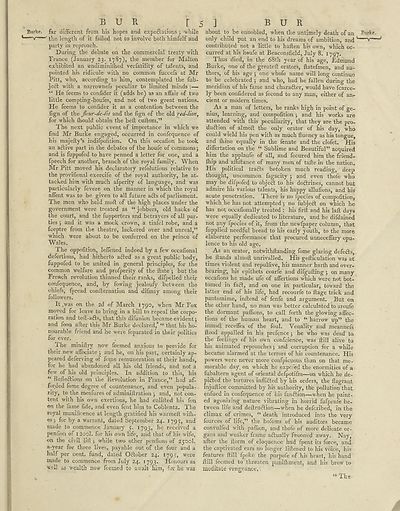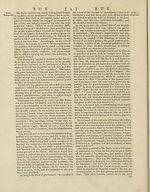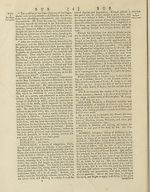Encyclopaedia Britannica, or, a Dictionary of arts, sciences, and miscellaneous literature : enlarged and improved. Illustrated with nearly six hundred engravings > Volume 5, BUR-CHI
(11) Page 5
Download files
Complete book:
Individual page:
Thumbnail gallery: Grid view | List view

EUR r 5
Burke, far different from his hopes and expectations ; while
—v 1 ' the length of it failed not to involve both himfelf and
party in reproach.
During the debate on the commercial treaty with
France (January 23. 1787), the member for Malton
exhibited an undiminifhed verfatility of talents, and
pointed his ridicule with no common fuccefs at Mr
Pitt, who, according to him, contemplated the fub-
je£t with a narrownefs peculiar to limited minds
“ He feems to confider it (adds he) as an affair of two
little compting-houfes, and not of two great nations.
He feems to confider it as a contention between the
lign of the fleur-de-lis and the fign of the old red-lion,
for which fliould obtain the belt cuftom.”
The next public event of importance in which we
find Mr Burke engaged, occurred in confequence of
his majefty’s indifpofition. On this occafion he took
an adfive part in the debates of the houfe of commons j
and is fuppofed to have penned a letter for one, and a
fpeech for another, branch of the royal family. When
Mr Pitt moved his declaratory refolutions relative to
the provifional exercife of the royal authority, he at¬
tacked him with much afperity of language, and was
particularly fevere on the manner in which the royal
affent was to be given to all future a£ts of parliament.
The men who held moft of the high places under the
government were treated as “ jobbers, old hacks of
the court, and the fupporters and betrayers of all par¬
ties } and it was a mock crown, a tinfel robe, and a
fceptre from the theatre, lackered over and unreal,”
which were about to be conferred on the prince of
Wales.
The oppofition, leffened indeed by a few occafional
defertions, had hitherto afted as a great public body,
fuppofed to be united in general principles, for the
common welfare and profperity of the ftate ; but the
French revolution thinned their ranks, difpelled their
confequence, and, by fowing jealoufy between the
chiefs, fpread conflernation and difmay among their
followers.
It .was on the 2d of March 1790, when Mr Fox
moved for leave to bring in a bill to repeal the corpo¬
ration and teft-afts, that this difunion became evident j
and foon after this Mr Burke declared,* “ that his ho¬
nourable friend and he were feparated in their politics
for ever.
J he miniftry nowr feemed anxious to provide for
their new affociate ; and he, on his part, certainly ap¬
peared deferving of fome remuneration at their hands,
for he had abandoned all his old friends, and not a
few of his old principles. In addition to this, his
“ Refieftions on the Revolution in France,” had af¬
forded fome degree of countenance, and even popula¬
rity, to the meafures of adminiftration j and, not con¬
tent with his own exertions, he had enliited his fon
on the lame fide, and even fent him to Coblentz. The
royal munificence at length gratified his warmetl willi¬
es; for by a warrant, dated September 24. 179?, and
made to commence January 5. 1793, he received a
penfion of 1200I. for his own life, and that of his wife,
on the civil lift ; while two other penfions of 2500I.
a-year for three lives, payable out of the four and a
half per cent, fund, dated October 24. 1795:, were
made to commence from July 24. 1793. Honours as
veil us wealth now feemed to await him, for he was
] BUR
about to be ennobled, when the untimely death of an Burke,
only child put an end to his dreams of ambition, and 1 ‘ /—■“
contributed not a little to haften his own, which oc¬
curred at his heufe at Beaconsfield, July 8. 1797.
Thus died, in the 68th year of his age, Edmund
Burke, one of the greateft orators, ftatefmen, and au¬
thors, of his age 5 one whofe name will long continue
to be celebrated *, and who, had he fallen during the
meridian of his fame and charafter, would have fcarce-
ly been confidered as fecond to any man, either of an¬
cient or modern times.
As a man of letters, he ranks high in point of ge¬
nius, learning, and compofition j and his works are
attended with this peculiarity, that they are the pro-
duftion of almoft the only orator of his day, who
could wield his pen with as much fluency as his tongue,
and ftrine equally in the fenate and the clofet. His
diflertation on the “ Sublime and Beautiful” acquired
him the applaufe of all, and fecured him the friend-
ftrip and affiftance of many men of tafte in the nation.
His political trafts betoken much reading, deep
thought, uncommon fagacity ; and even thofe who
may be difpofeft to objeft to his dodtrines, cannot but
admire his various talents, his happy allufions, and his
acute penetration. There is no fpecies of compofition,
which he has not attempted j no fubjecl on which he
has not oceafionally treated : his firft and his laft days
Avere equally dedicated to literature, and he difdained
not any fpecies of it, from the newfpaper column, that
fupplied needful bread to his early youth, to the more
elaborate performance that procured unneceffary opu¬
lence to his old age.
As an orator, notwithftanding fome glaring defedls,
he ftands almoft unrivalled. His gefticulation was at
times violent and repulfive, his manner harfti and over¬
bearing, his epithets coarfe and difgufting ; on many
occafions he made ufe of afiertions which were not bot¬
tomed in fact, and on one in particular, toward the
latter end of his life, had recourfe to ftage trick and
pantomime, inftead of fenfe and argument. But on
the other hand, no man was better calculated to aroufe
the dormant paflions, to call forth the glowing affec¬
tions of the human heart, and to “ harrow up” the
inmoft receffes of the foul. Venality and meannefs
flood appalled in his prefence; he who was dead to
the feelings of his own confidence, was ftill alive to
his animated reproaches j and corruption for a while
became alarmed at the terrors of his countenance. His
powers were never more confpicuous than on that me¬
morable day. on which he expofed the enormities of a
fubaltern agent of oriental defpotifm—on which he de¬
picted the tortures inflicted by his orders, the flagrant
injuftice committed by his authority, the pollution that
enfued in confequence of his fanftion—when he paint¬
ed agonizing nature vibrating in horrid fufpenfe be¬
tween life and deftruCtion—when he defcribed, in the
climax of crimes, “ death introduced into the very
fources of life,” the bofoms of his auditors became
convulfed with paflion, and thofe of more delicate or¬
gans and weaker frame aftually fwooned away. Nay,
after the florm of eloquence had fpent its force, and
the captivated ears no longer liftened to his voice, his
features ftill fpoke the purpofe of his heart, his hand
ftill feemed to threaten punifhment, and his brow to
meditate vengeance,.
“ The
Burke, far different from his hopes and expectations ; while
—v 1 ' the length of it failed not to involve both himfelf and
party in reproach.
During the debate on the commercial treaty with
France (January 23. 1787), the member for Malton
exhibited an undiminifhed verfatility of talents, and
pointed his ridicule with no common fuccefs at Mr
Pitt, who, according to him, contemplated the fub-
je£t with a narrownefs peculiar to limited minds
“ He feems to confider it (adds he) as an affair of two
little compting-houfes, and not of two great nations.
He feems to confider it as a contention between the
lign of the fleur-de-lis and the fign of the old red-lion,
for which fliould obtain the belt cuftom.”
The next public event of importance in which we
find Mr Burke engaged, occurred in confequence of
his majefty’s indifpofition. On this occafion he took
an adfive part in the debates of the houfe of commons j
and is fuppofed to have penned a letter for one, and a
fpeech for another, branch of the royal family. When
Mr Pitt moved his declaratory refolutions relative to
the provifional exercife of the royal authority, he at¬
tacked him with much afperity of language, and was
particularly fevere on the manner in which the royal
affent was to be given to all future a£ts of parliament.
The men who held moft of the high places under the
government were treated as “ jobbers, old hacks of
the court, and the fupporters and betrayers of all par¬
ties } and it was a mock crown, a tinfel robe, and a
fceptre from the theatre, lackered over and unreal,”
which were about to be conferred on the prince of
Wales.
The oppofition, leffened indeed by a few occafional
defertions, had hitherto afted as a great public body,
fuppofed to be united in general principles, for the
common welfare and profperity of the ftate ; but the
French revolution thinned their ranks, difpelled their
confequence, and, by fowing jealoufy between the
chiefs, fpread conflernation and difmay among their
followers.
It .was on the 2d of March 1790, when Mr Fox
moved for leave to bring in a bill to repeal the corpo¬
ration and teft-afts, that this difunion became evident j
and foon after this Mr Burke declared,* “ that his ho¬
nourable friend and he were feparated in their politics
for ever.
J he miniftry nowr feemed anxious to provide for
their new affociate ; and he, on his part, certainly ap¬
peared deferving of fome remuneration at their hands,
for he had abandoned all his old friends, and not a
few of his old principles. In addition to this, his
“ Refieftions on the Revolution in France,” had af¬
forded fome degree of countenance, and even popula¬
rity, to the meafures of adminiftration j and, not con¬
tent with his own exertions, he had enliited his fon
on the lame fide, and even fent him to Coblentz. The
royal munificence at length gratified his warmetl willi¬
es; for by a warrant, dated September 24. 179?, and
made to commence January 5. 1793, he received a
penfion of 1200I. for his own life, and that of his wife,
on the civil lift ; while two other penfions of 2500I.
a-year for three lives, payable out of the four and a
half per cent, fund, dated October 24. 1795:, were
made to commence from July 24. 1793. Honours as
veil us wealth now feemed to await him, for he was
] BUR
about to be ennobled, when the untimely death of an Burke,
only child put an end to his dreams of ambition, and 1 ‘ /—■“
contributed not a little to haften his own, which oc¬
curred at his heufe at Beaconsfield, July 8. 1797.
Thus died, in the 68th year of his age, Edmund
Burke, one of the greateft orators, ftatefmen, and au¬
thors, of his age 5 one whofe name will long continue
to be celebrated *, and who, had he fallen during the
meridian of his fame and charafter, would have fcarce-
ly been confidered as fecond to any man, either of an¬
cient or modern times.
As a man of letters, he ranks high in point of ge¬
nius, learning, and compofition j and his works are
attended with this peculiarity, that they are the pro-
duftion of almoft the only orator of his day, who
could wield his pen with as much fluency as his tongue,
and ftrine equally in the fenate and the clofet. His
diflertation on the “ Sublime and Beautiful” acquired
him the applaufe of all, and fecured him the friend-
ftrip and affiftance of many men of tafte in the nation.
His political trafts betoken much reading, deep
thought, uncommon fagacity ; and even thofe who
may be difpofeft to objeft to his dodtrines, cannot but
admire his various talents, his happy allufions, and his
acute penetration. There is no fpecies of compofition,
which he has not attempted j no fubjecl on which he
has not oceafionally treated : his firft and his laft days
Avere equally dedicated to literature, and he difdained
not any fpecies of it, from the newfpaper column, that
fupplied needful bread to his early youth, to the more
elaborate performance that procured unneceffary opu¬
lence to his old age.
As an orator, notwithftanding fome glaring defedls,
he ftands almoft unrivalled. His gefticulation was at
times violent and repulfive, his manner harfti and over¬
bearing, his epithets coarfe and difgufting ; on many
occafions he made ufe of afiertions which were not bot¬
tomed in fact, and on one in particular, toward the
latter end of his life, had recourfe to ftage trick and
pantomime, inftead of fenfe and argument. But on
the other hand, no man was better calculated to aroufe
the dormant paflions, to call forth the glowing affec¬
tions of the human heart, and to “ harrow up” the
inmoft receffes of the foul. Venality and meannefs
flood appalled in his prefence; he who was dead to
the feelings of his own confidence, was ftill alive to
his animated reproaches j and corruption for a while
became alarmed at the terrors of his countenance. His
powers were never more confpicuous than on that me¬
morable day. on which he expofed the enormities of a
fubaltern agent of oriental defpotifm—on which he de¬
picted the tortures inflicted by his orders, the flagrant
injuftice committed by his authority, the pollution that
enfued in confequence of his fanftion—when he paint¬
ed agonizing nature vibrating in horrid fufpenfe be¬
tween life and deftruCtion—when he defcribed, in the
climax of crimes, “ death introduced into the very
fources of life,” the bofoms of his auditors became
convulfed with paflion, and thofe of more delicate or¬
gans and weaker frame aftually fwooned away. Nay,
after the florm of eloquence had fpent its force, and
the captivated ears no longer liftened to his voice, his
features ftill fpoke the purpofe of his heart, his hand
ftill feemed to threaten punifhment, and his brow to
meditate vengeance,.
“ The
Set display mode to:
![]() Universal Viewer |
Universal Viewer | ![]() Mirador |
Large image | Transcription
Mirador |
Large image | Transcription
Images and transcriptions on this page, including medium image downloads, may be used under the Creative Commons Attribution 4.0 International Licence unless otherwise stated. ![]()
| Permanent URL | https://digital.nls.uk/192984412 |
|---|
| Attribution and copyright: |
|
|---|
| Description | Ten editions of 'Encyclopaedia Britannica', issued from 1768-1903, in 231 volumes. Originally issued in 100 weekly parts (3 volumes) between 1768 and 1771 by publishers: Colin Macfarquhar and Andrew Bell (Edinburgh); editor: William Smellie: engraver: Andrew Bell. Expanded editions in the 19th century featured more volumes and contributions from leading experts in their fields. Managed and published in Edinburgh up to the 9th edition (25 volumes, from 1875-1889); the 10th edition (1902-1903) re-issued the 9th edition, with 11 supplementary volumes. |
|---|---|
| Additional NLS resources: |
|

